|
|
|
Sort Order |
|
|
|
Items / Page
|
|
|
|
|
|
|
| Srl | Item |
| 1 |
ID:
175713
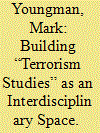

|
|
|
|
|
| Summary/Abstract |
Over the years, there have been many debates regarding the state of research into terrorism and whether “terrorism studies” constitutes an academic discipline in its own right. Such reflections, coupled with the natural evolution of what is still a relatively new area of research, have arguably led to significant improvements in quality and rigour. At the same time, the status of terrorism studies itself remains somewhat ambiguous: it is both discussed as a distinct field and simultaneously evades criticism by pointing to the difficulties of defining its boundaries. There are undoubtedly a number of advantages to forming a separate discipline, which would go some way to helping the field address some of the recurring problems that terrorism research faces. However, this article ultimately argues that scholars are better served by deliberately moving in the other direction and developing the field as a space for interdisciplinary engagement.
|
|
|
|
|
|
|
|
|
|
|
|
|
|
|
|
| 2 |
ID:
094574
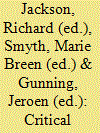

|
|
|
|
|
| Publication |
London, Routledge, 2009.
|
| Description |
xiii, 274p.
|
| Standard Number |
9780415455077
|
|
|
|
|
|
|
|
|
|
|
|
Copies: C:1/I:0,R:0,Q:0
Circulation
| Accession# | Call# | Current Location | Status | Policy | Location |
| 054854 | 363.325072/JAC 054854 | Main | On Shelf | General | |
|
|
|
|
| 3 |
ID:
087470
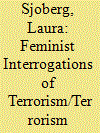

|
|
|
| 4 |
ID:
145670
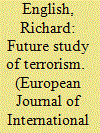

|
|
|
|
|
| Summary/Abstract |
This article reflects on the central problems to be faced over the next fifty years of the academic study of terrorism. It discusses a series of problems that are sometimes raised (regarding definition, the division between Critical Terrorism Studies and Orthodox Terrorism Studies, and the supposed stagnation in contemporary terrorism research), and argues that these present rather limited difficulties, in reality. It then identifies a greater problem, in the form of a five-fold fragmentation of the current field, before offering suggested means of addressing in practice these latter, more profound difficulties.
|
|
|
|
|
|
|
|
|
|
|
|
|
|
|
|
| 5 |
ID:
156900
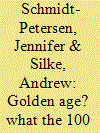

|
|
|
|
|
| Summary/Abstract |
In a context where widespread failings in the nature of terrorism research are well recognised—yet where the quantity of work is still enormous—is it possible to fairly assess whether the field is progressing or if it has become mired in mediocre research? Citation analysis is widely used to reveal the evolution and extent of progress in fields of study and to provide valuable insight into major trends and achievements. This study identifies and analyses the current 100 most cited journal articles in terrorism studies. A search was performed using Google Scholar for peer-reviewed journal articles on subjects related to terrorism and counter-terrorism. The most cited articles were published across sixty-two journals, which reflected the interdisciplinary nature of terrorism studies. Compared to other articles, the most cited articles were more likely to be the result of collaborative research and were also more likely to provide new data. Sixty-three of the top 100 articles have been published since 2001. The findings are discussed in relation to the evolution of terrorism research and current debates on progress in the field.
|
|
|
|
|
|
|
|
|
|
|
|
|
|
|
|
| 6 |
ID:
190972
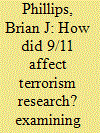

|
|
|
|
|
| Summary/Abstract |
Terrorism research increased markedly after the attacks of September 11, 2001 (9/11). How has research on this subject changed in the past twenty years? I examine data on more than 6,000 academic articles on terrorism between 1970 and 2019, and the more than 1,500 authors of multiple articles. This information comes from every article in the Web of Science database with “terrorism” or “terrorist” in the title. Several primary findings emerge. (1) The volume of terrorism research surged to record highs after 9/11, and has not decreased since. (2) Psychologists became the most numerous terrorism researchers after 9/11, displacing political scientists for about ten years. Research on health or medical aspects of terrorism jumped after 9/11. (3) The proportion of female scholars increased substantially after 9/11, outpacing the rise in academia generally. This is in part because scholars new to the field were often from disciplines with relatively high percentages of women, such as psychology. (4) Terrorism scholars were mostly based in North America or Western Europe before 9/11, but the number of countries with scholars publishing terrorism research expanded considerably after 2001. Overall, terrorism research has developed in many ways over the decades, but 9/11 led to fundamental changes.
|
|
|
|
|
|
|
|
|
|
|
|
|
|
|
|
| 7 |
ID:
109141


|
|
|
|
|
| Publication |
2011.
|
| Summary/Abstract |
My aim in this article is to extend Marc Sageman's seminal research on Al Qaeda by re-articulating it through the prism of Albert Cohen's theory of delinquent subcultures, an approach which came to prominence in Criminology in the 1960s, but has since then been largely eclipsed by other approaches in that field. Drawing on Sageman's findings and observations, I suggest that Al Qaeda-affiliated or -inspired groups in the West can be best understood as a collective response or "solution" to the strains encountered by the members of these groups, and that these strains are imposed on them by the circumstances in which they find themselves. My broader aim is to show that although Criminology, with a few exceptions, ignores the subject of terrorism, terrorism studies can appreciably benefit from an engagement with Criminology as a source of theoretical inspiration.
|
|
|
|
|
|
|
|
|
|
|
|
|
|
|
|
| 8 |
ID:
110005
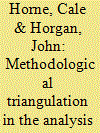

|
|
|
|
|
| Publication |
2012.
|
| Summary/Abstract |
The conceptualization of terrorist groups as networks is increasingly common to terrorism studies, although methods of analysis vary widely. Contrary to common understandings, the integration of computational and qualitative methods is possible even with limited (small-n) data. The triangulation of different methods can produce insights overlooked by the use of any single method and validate findings across methods. This article demonstrates some of the possibilities for integrating qualitative and quantitative methods for network analysis using Raffaello Pantucci's recent article, "The Tottenham Ayatollah and The Hook-Handed Cleric: An Examination of All Their Jihadi Children."
|
|
|
|
|
|
|
|
|
|
|
|
|
|
|
|
| 9 |
ID:
179836
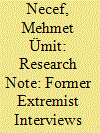

|
|
|
|
|
| Summary/Abstract |
In this article I describe how recognizing elements from my own extremist past made me emotional while interviewing a jailed terrorist about his motivations for joining Islamic State. I relate how this mood led me to an uncontrolled self-disclosure and recount how he agreed to elaborate on his motivations for joining IS, despite initial reluctance to talk about them. Then, I present some considerations on whether research in which emotional attachment is involved can produce critical scientific knowledge. The basic aim of the article is to develop methods, concepts and means to contribute to research on the motivations of terrorists.
|
|
|
|
|
|
|
|
|
|
|
|
|
|
|
|
| 10 |
ID:
073768
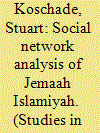

|
|
|
|
|
| Publication |
2006.
|
| Summary/Abstract |
This article attempts to contribute to and advance the growing literature on social network analysis and terrorism studies, through a social network analysis of the Jemaah Islamiyah cell that was responsible for the Bali bombings in 2002. In doing so, the article endeavors to provide a potential framework for the intelligence analysis of terrorist cells. Such a framework will assist in (1) understanding the communication and structure of such cells and (2) assist in predicting the likely outcomes of terrorist cells when employed in real-time intelligence analysis.
|
|
|
|
|
|
|
|
|
|
|
|
|
|
|
|
| 11 |
ID:
086327
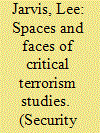

|
|
|
|
|
| Publication |
2009.
|
| Summary/Abstract |
This article explores the burgeoning academic interest in establishing a critical terrorism studies research programme. It begins by reviewing the debates over definition, causation and response that still dominate mainstream discussions of terrorism. The analytical and normative limitations of these debates, it argues, open considerable space for the emergence of a critically oriented body of literature. A second section then explores two distinct efforts at overcoming these limitations: the broadening and interpretivist faces of critical terrorism studies. The broadening face refers to attempts to expand our understanding of terrorism beyond non-state violence alone, while the interpretivist face comprises critical explorations of terror in image and narrative. Although each of these approaches offers scholars a more engaged role than the problem-solving orientation of the mainstream debates, the article argues that only the interpretivist face is capable of addressing their analytical limitations. The article concludes by calling for further attention to the notion of critique within the relevant critical literature.
|
|
|
|
|
|
|
|
|
|
|
|
|
|
|
|
| 12 |
ID:
188090
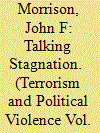

|
|
|
|
|
| Summary/Abstract |
In 2014, Marc Sageman proposed that terrorism research had stagnated. The claim of stagnation has resulted in a period of collective review within terrorism studies. To date, the fruits of this review have revealed a more cautiously optimistic view of the field than that proposed by Sageman. This article aims to add to this review by analyzing the interviews of forty-three guests from the first season of the Talking Terror podcast. Presented is a thematic analysis of their views on the overall health of terrorism research. The interviewees included both pre-and post-9/11 researchers. Through this analysis four themes are identified: Interdisciplinary Research and Researchers, Data, Applied Research, and Area/Field. The majority of interviewees were more optimistic than Sageman in relation to the overall health of the area. Analysis of their responses is presented alongside some recommendations for the future direction of the area.
|
|
|
|
|
|
|
|
|
|
|
|
|
|
|
|
| 13 |
ID:
108747
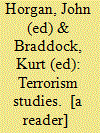

|
|
|
|
|
| Publication |
Oxon, Routledge, 2012.
|
| Description |
xxiii, 504p.
|
| Standard Number |
9780415455053
|
|
|
|
|
|
|
|
|
|
|
|
Copies: C:1/I:0,R:0,Q:0
Circulation
| Accession# | Call# | Current Location | Status | Policy | Location |
| 056355 | 363.325/HOR 056355 | Main | On Shelf | General | |
|
|
|
|
| 14 |
ID:
154968


|
|
|
|
|
| Summary/Abstract |
Terrorists learn every day to gain further knowledge on how to achieve their violent objectives. Consequently, understanding terrorist learning forms a crucial part of the fight to counter terrorism. However, while existing literature within terrorism studies has examined a number of different parts of the learning process, there currently fails to exist a comprehensive framework to encompass the learning process as a whole. This article will rectify this oversight by drawing on wider learning literature to develop a new analytical framework for terrorist learning that provides a definition, considers the actors involved and identifies processes and outcomes. Consequently, the full landscape of current and potential research in this important area is revealed.
|
|
|
|
|
|
|
|
|
|
|
|
|
|
|
|
| 15 |
ID:
163718
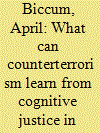

|
|
|
|
|
| Summary/Abstract |
Global citizenship education (GCE) has been elevated by the UN to form both part of its Sustainable Development Goals for education and the central tenet in its Preventing Violent Extremism through Education (PVE-E) strategy. I argue that GCE has no chance of playing a role in counterterrorism unless it embraces a decolonial approach to cognitive justice. The paper provides a descriptive account of the politics of GCE and its take-up by the UN and UNESCO, including an account of postcolonial and decolonial approaches to GCE. The paper conducts an interpretive discourse analysis of textual data around UNESCO's approach to GCE and PVE-E to assess how, if at all, history and historical literacy is addressed. Through this analysis, combined with interview data, previous ethnographic experience, and secondary literature in the field of terrorism studies and political violence, the paper concludes by making a case for the inclusion of historical literacy in education designed to promote peace, justice, and global citizenship. The paper makes no naïve claims about GCE as a panacea for political violence; rather it suggests that if there is any hope of it performing the function that UNESCO ascribes to it, it will only be through the inclusion of cognitive justice.
|
|
|
|
|
|
|
|
|
|
|
|
|
|
|
|
| 16 |
ID:
140866
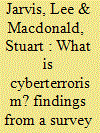

|
|
|
|
|
| Summary/Abstract |
This article reports on a recent survey designed to capture understandings of cyberterrorism across the global research community. Specifically, it explores competing views, and the importance thereof, amongst 118 respondents on three definitional issues: (a) the need for a specific definition of cyberterrorism for either policymakers or researchers; (b) the core characteristics or constituent parts of this concept; and (c) the value of applying the term “cyberterrorism” to a range of actual or potential scenarios. The article concludes by arguing that while a majority of researchers believe a specific definition of cyberterrorism is necessary for academics and policymakers, disagreement around what this might look like has additional potential to stimulate a rethinking of terrorism more widely.
|
|
|
|
|
|
|
|
|
|
|
|
|
|
|
|
|
|
|
|
|